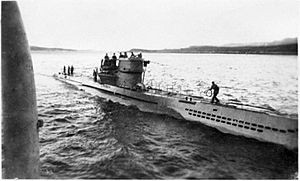German submarine U-992 facts for kids
German submarine U-992 was a special kind of submarine called a Type VIIC U-boat. It was built for Nazi Germany's navy, the Kriegsmarine, during World War II.
This submarine was started on 30 October 1942 by a company called Blohm & Voss in Hamburg, Germany. It was officially launched on 24 June 1943 and joined the navy on 2 August 1943. Its commander was a man named Oberleutnant zur See Hans Falke.

U-992 surrendered to HMCS Nene in May 1945
|
|
Quick facts for kids History |
|
|---|---|
| Name | U-992 |
| Ordered | 25 May 1941 |
| Builder | Blohm & Voss, Hamburg |
| Yard number | 192 |
| Laid down | 30 October 1942 |
| Launched | 24 June 1943 |
| Commissioned | 2 August 1943 |
| Fate |
|
| General characteristics | |
| Class and type | Type VIIC submarine |
| Displacement |
|
| Length |
|
| Beam |
|
| Draught | 4.74 m (15 ft 7 in) |
| Installed power |
|
| Propulsion |
|
| Speed |
|
| Range | |
| Test depth |
|
| Complement | 4 officers, 40–56 enlisted |
| Armament |
|
| Service record | |
| Part of: |
|
| Commanders: |
|
| Operations: |
|
| Victories: | 1 warship total loss (1,060 tons) |
Contents
Submarine Design and Features
The U-992 was a Type VIIC submarine. These were a common type of German U-boat during World War II.
When it was on the surface, U-992 weighed about 769 tonnes. When it was underwater, it weighed about 871 tonnes. The submarine was about 67.10 meters (220 feet) long overall. Its main body, called the pressure hull, was about 50.50 meters (165 feet) long.
Power and Speed
The U-992 had two diesel engines for moving on the surface. These engines could produce a lot of power, between 2800 and 3200 horsepower. When it was underwater, it used two electric motors, which produced about 750 horsepower.
With its diesel engines, the submarine could travel at a top speed of 17.7 knots (about 32.8 kilometers per hour) on the surface. Underwater, its top speed was 7.6 knots (about 14.1 kilometers per hour).
It could travel a very long distance on the surface, about 8,500 nautical miles (15,742 kilometers) at a slower speed. Underwater, it could travel about 80 nautical miles (148 kilometers) at a slow speed before needing to surface.
Depth and Crew
This U-boat could dive to a depth of about 230 meters (750 feet). Its maximum "crush depth," meaning the deepest it could go before its hull might break, was between 250 and 295 meters (820 to 968 feet).
The submarine usually had a crew of about 4 officers and between 40 and 56 sailors.
Weapons
U-992 was armed with five torpedo tubes. Four of these were at the front (bow) of the submarine, and one was at the back (stern). It could carry 14 torpedoes. Instead of torpedoes, it could also carry 26 naval mines.
For fighting on the surface, it had an 8.8 cm (3.5 inch) deck gun. It also had a twin 2 cm (0.79 inch) anti-aircraft gun to defend against airplanes.
Service History
U-992's journey began with training. From August 1943 to February 1944, it trained with the 5th U-boat Flotilla. After that, it joined different groups of submarines, called flotillas, for active service.
- From March to May 1944, it was part of the 3rd U-boat Flotilla.
- From June to September 1944, it moved to the 11th U-boat Flotilla.
- Finally, from October 1944 until the end of the war in May 1945, it was with the 13th U-boat Flotilla.
U-992 went on 8 patrols during its time in service. These patrols involved searching for enemy ships and carrying out missions.
Wolfpacks
During the war, U-992 took part in seven "wolfpacks." A wolfpack was a group of U-boats that worked together to hunt enemy ships, especially convoys (groups of merchant ships traveling together).
Some of the wolfpacks U-992 was part of included:
- Trutz (June – July 1944)
- Dachs (September 1944)
- Zorn (September – October 1944)
- Grimm (October 1944)
- Panther (October – November 1944)
- Stier (December 1944)
- Hagen (March 1945)
Fate of U-992
As World War II was ending, U-992 surrendered on 9 May 1945 in Narvik, Norway. After its surrender, it was taken to Loch Eriboll, Scotland, on 19 May 1945.
Later that year, on 16 December 1945, U-992 was sunk. This happened as part of an operation called Operation Deadlight. During Operation Deadlight, many surrendered German U-boats were deliberately sunk by the Allied forces to prevent them from being used again.
Summary of Raiding History
During its service, U-992 was involved in one notable event where it caused significant damage to an enemy ship.
| Date | Ship Name | Nationality | Tonnage | Fate |
|---|---|---|---|---|
| 13 February 1945 | HMS Denbigh Castle | 1,060 | Total loss |
 | William Lucy |
 | Charles Hayes |
 | Cleveland Robinson |

